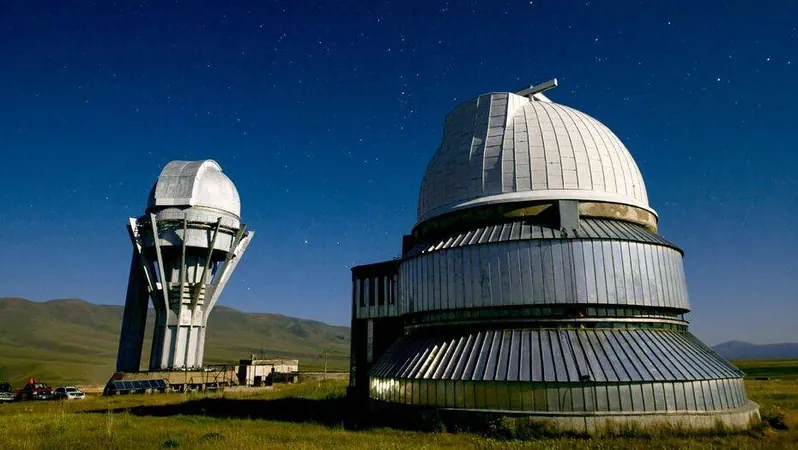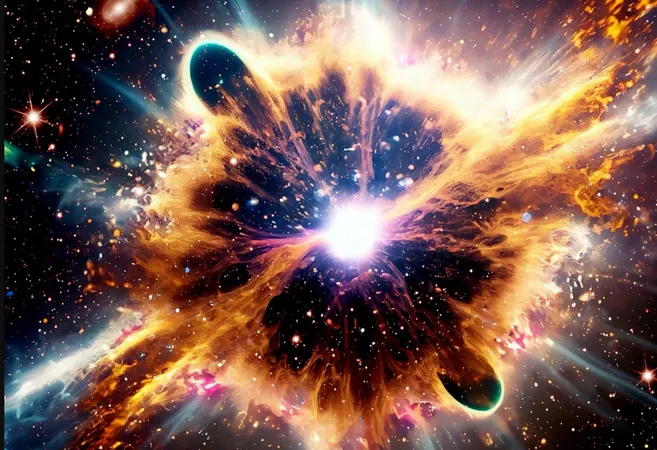
Kazakhstan Unveils New Telescope in Global Asteroid Defense Initiative
2025-06-14
Author: Sophie
Astana's Latest Addition to Space Safety
In an exciting leap for space safety, Kazakhstan has installed a cutting-edge telescope at the Assy-Turgen Observatory, nestled in the stunning Zailiyskiy Alatau mountains. This powerful instrument is designed to detect and track hazardous celestial bodies, including potentially menacing asteroids that could intersect with Earth, along with tracking elusive space debris.
Joining Forces in the Fight Against Asteroids
Kazakhstan's involvement is part of a broader global initiative aimed at upgrading asteroid monitoring systems. Major international projects, including collaborations with leading French aerospace companies, are already in play. A vast network of telescopes has been established across various countries, and now, Kazakhstan adds its vital capabilities to this global effort.
Mystery Object Sparks Curiosity
Just days prior to this installation, residents of Astana witnessed a captivating spectacle in the skies. An unidentified object entered the atmosphere, which experts suspect to be debris from a defunct satellite or relics from a rocket booster. Fortunately, it was small enough to disintegrate completely before reaching the ground.
A Collaborative Effort for Astronomy
The telescope project exemplifies the fruitful partnership between Kazakhstan and France, bolstered by the collaboration of scientific bodies and researchers. Guillaume Delomenie, a research engineer, highlighted the observatory's ideal conditions for stellar observations—boasting minimal light pollution and a pristine atmosphere.
Groundbreaking Technology in Action
Equipped with advanced optical technology, this telescope can identify objects as small as 10 centimeters in diameter. These miniature fragments present substantial risks to operational satellites. Thanks to its robotic capabilities, the telescope will be remotely operated using satellite internet, ensuring seamless data transmission back to a central hub in Paris.
Kazakhstan's Aspiration as an Astrophysical Hub
The installation aligns with the Kazakh Astrophysical Institute's vision of establishing an astrophysical powerhouse in the region. This hub will place a strong emphasis on applied research focused on the safety of satellite constellations.
Rising Risks in Space
Chingis Omarov, Director of the Fesenkov Astrophysical Institute, warned that with the ever-growing number of satellites, the risks of potential collisions are rising. He emphasized the importance of astronomy and astrophysics in safeguarding vital satellite infrastructure.
International Interest in Kazakhstan's Advancements
Currently, various scientific institutions from countries such as China, India, and Poland are keenly interested in what Kazakhstan has to offer in terms of space research. As the telescope becomes fully operational, the next phase will focus on advancing fundamental research to help mitigate the risks posed by our busy skies.









 Brasil (PT)
Brasil (PT)
 Canada (EN)
Canada (EN)
 Chile (ES)
Chile (ES)
 Česko (CS)
Česko (CS)
 대한민국 (KO)
대한민국 (KO)
 España (ES)
España (ES)
 France (FR)
France (FR)
 Hong Kong (EN)
Hong Kong (EN)
 Italia (IT)
Italia (IT)
 日本 (JA)
日本 (JA)
 Magyarország (HU)
Magyarország (HU)
 Norge (NO)
Norge (NO)
 Polska (PL)
Polska (PL)
 Schweiz (DE)
Schweiz (DE)
 Singapore (EN)
Singapore (EN)
 Sverige (SV)
Sverige (SV)
 Suomi (FI)
Suomi (FI)
 Türkiye (TR)
Türkiye (TR)
 الإمارات العربية المتحدة (AR)
الإمارات العربية المتحدة (AR)